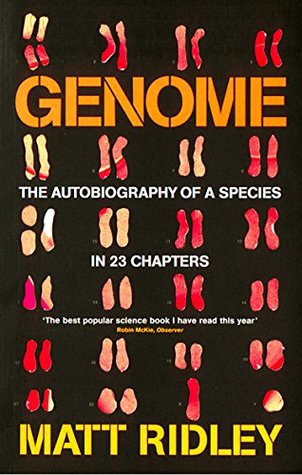More on this book
Community
Kindle Notes & Highlights
by
Matt Ridley
Read between
October 3 - November 6, 2021
There are twenty-three chapters, called CHROMOSOMES. Each chapter contains several thousand stories, called GENES. Each story is made up of paragraphs, called EXONS, which are interrupted by advertisements called INTRONS. Each paragraph is made up of words, called CODONS. Each word is written in letters called BASES.
Life is a slippery thing to define, but it consists of two very different skills: the ability to replicate, and the ability to create order.
Heredity is a modifiable stored program; metabolism is a universal machine. The recipe that links them is a code, an abstract message that can be embodied in a chemical, physical or even immaterial form. Its secret is that it can cause itself to be replicated.
To paraphrase Samuel Butler, a protein is just a gene’s way of making another gene; and a gene is just a protein’s way of making another protein.
Protein represents chemistry, living, breathing, metabolism and behaviour – what biologists call the phenotype. DNA represents information, replication, breeding, sex – what biologists call the genotype.
We now know that the main purpose of genes is to store the recipe for making proteins. It is proteins that do almost every chemical, structural and regulatory thing that is done in the body: they generate energy, fight infection, digest food, form hair, carry oxygen and so on and on. Every single protein in the body is made from a gene by a translation of the genetic code. The same is not quite true in reverse: there are genes, which are never translated into protein,
genes were recipes for proteins; mutations were altered proteins made by altered genes.
There are a billion three-letter ‘words’ in your genome. Yet the length of just this one little motif is all that stands between each of us and mental illness.
Testing without counselling is a recipe for misery.
There is a hint of your father’s looks in your face, but it blends with a hint of your mother’s looks, too, and yet is not the same as your sister’s – there is something unique about your own looks.
Paradoxically, this is a corner of science where the ‘expert’ has usually been more wrong than the layman. Ordinary people have always known that education matters, but equally they have always believed in some innate ability. It is the experts who have taken extreme and absurd positions at either end of the spectrum.
You inherit not your IQ but your ability to develop a high IQ under certain environmental circumstances.
The idea of genes for behaviour is no more strange than the idea of genes for development. Both are mind-boggling, but nature has never found human incomprehension a reason for changing her methods.
The body is the victim, plaything, battleground and vehicle for the ambitions of genes.
Homosexuality seemed to run in the female line. If a man was gay, the most likely other member of the previous generation to be gay was not his father but his mother’s brother.
You are not a brain running a body by switching on hormones. Nor are you a body running a genome by switching on hormone receptors. Nor are you a genome running a brain by switching on genes that switch on hormones. You are all of these at once.
The tension between universal characteristics of the human race and particular features of individuals is what the genome is all about.
Melatonin is made from serotonin, so serotonin levels drop as it gets used up in melatonin manufacture. The quickest way to raise serotonin levels again is to send more tryptophan into the brain, because serotonin is made from tryptophan. The quickest way to send more tryptophan into the brain is to secrete insulin from the pancreas, because insulin causes the body to absorb other chemicals similar to tryptophan, thus removing competitors for the channels that take tryptophan into the brain. And the quickest way to secrete insulin is to eat a carbohydrate snack.
It takes fewer than fifty cell doublings to make a body from a fertilised egg and only a few hundred more to keep the skin in good repair.
Natural selection has designed all parts of our bodies to last just long enough to see our children into independence, no more.
Instinct is genetically-determined behaviour; learning is behaviour modified by experience.
Mutation is random, but selection is not.
‘We talk about gene therapy as if it can change someone’s fate, but you can also change someone’s fate if you pay off their credit card.’
God, almost by definition, seems to deny free will or He would not be omnipotent.
Christianity in particular has striven to preserve a concept of free will because, without it, human beings cannot be held accountable for their actions. Without accountability, sin is a mockery and Hell a damnable injustice from a just God.


